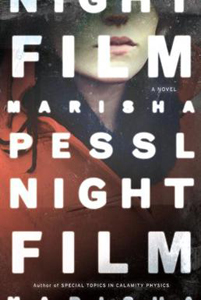In “Night Film” (2013), Marisha Pessl blends the economical prose of old-school hardboiled mysteries with poetic bursts of insight into the human condition. The novel has familiar genre pleasures but reaches for a next level. It’s one of the best experiences I’ve had reading a 21st century puzzle mystery, even though I suspect this is a one-of-a-kind genre outing from Pessl.
Sleuthing trio
We follow three engaging sleuths (or pseudo-sleuths) – a middle-aged investigative reporter and two 20-something hangers-on – in the probing of the suicide of young piano genius Ashley Cordova (who becomes a fourth main character of sorts). I mean “mystery” partially in the sense of clues and leads, but also in the sense of an intangible weirdness.
In the prolog, narrator and main character Scott McGrath is jogging at night in a dockside New York park when a woman (who he later realizes closely resembles the deceased) in a red coat stalks him, moving through the shadows with unnatural stealth and speed.

“Night Film” (2013)
Author: Marisha Pessl
Genres: Mystery, horror
Setting: 2013, New York City and upstate
Note to readers: The Book Club Book Report series features books I’m reading for my book club, Brilliant Bookworms.
At nearly 600 pages, “Night Film” is supernatural horror grounded in the real world, somewhat like a modern “The Exorcist.” McGrath struggles with his ex-wife for time with his daughter. And he’s shadowed by his past professional disgrace, wherein he got overzealous in accusing filmmaker Stanislas Cordova of being a criminal.
McGrath’s assistants – who he initially wishes would go away but who end up being valuable – are Nora and Hopper. Nora is an aspiring actress, an MPDG at first glance who was raised in an old-folks’ home and favors outdated fashions. Hopper is so strikingly good-looking that he could be an actor, but the money from dealing drugs is too good.
The author adds to the grounded nature by interspersing news articles, magazine features, web page stills, interview notes and Polaroids from McGrath’s files on the late Ashley, daughter of Stanislas and artistic prodigy in her own right.
The Cordova mythology
At the same time, Pessl builds a mythology around Cordova with perhaps-supernatural elements that suggest something sinister happens on the upstate grounds where he makes his films. Is he a snuff filmmaker? Are the horrors in his films real?
“Night Film” uses enough real-world references to suggest Pessl is basing Cordova on a blend of Kubrick, Fincher, Tarantino and Scorsese. But she goes beyond that to imagine someone who has earned a next level of deep-web fascination.
It doesn’t all hold up on close examination, as Cordova has both mainstream success and a cult following. McGrath himself owns an eight-film Warner Bros. collection of Cordova’s films. Yet other films have never been released; you can only get them as expensive bootlegs or see them at (literally) underground screenings.

Cordova’s career path doesn’t make sense. However, I forgive Pessl for this because it’s just another element – if a shaky one – of pushing the boundary between the real and the surreal while keeping “Night Film” accessible on a paragraph-by-paragraph level.
When McGrath gets deep into the weeds (literally, as Pessl evocatively describes the swamp-bordered estate) of his Cordova probe, we do get one segment that’s like when Philip K. Dick goes on a drug trip (for his character, and perhaps himself) in “Lies, Inc.,” his expansion of “The Unteleported Man.” Here, it’s disconcerting with a purpose, but fortunately it’s not too long before we’re back to the smoother prose.
(Initially tripping up the smoothness is the author’s overuse of italicized words within quotes and thoughts, but I learned to read over them.)
Novel as a stand-in for film
“Night Film” is metaphorically McGrath’s own experience in a Cordova picture – and at times we’re asked to wonder if the detective is literally somehow in a Cordova film, being manipulated by a master string-puller. In a way, Pessl – who displays preternatural insights into life that bely her age (born 1977) — is Cordova. By luck of the draw, her mastered medium happens to be the novel, so therefore she writes a “night film” (a horror movie with pitch-black themes) as a book.
Those analytical thoughts on the part of the reader don’t cancel out the fact that “Night Film” is still a mystery. With a buildup so deeply intriguing, can the author possibly pay it off? Well, the last chunk of the book is unusual. The case is solved on a literal level, but many pages remain beyond what seems like the end point.
This ends up being a feature more than a bug, because by now we’re thoroughly on board with McGrath. We can’t turn away any more than he can as he tries to wring every last bit of revelation out of the Cordova case. But I did read the closing chapters more slowly; the furious “I need to know more” quality of the mystery gives way to questions about life and reality that require a delicate engagement.
Pessl is a good enough author to be a mystery series writer (she only has two other novels, and I might check them out). But by the end of “Night Film” I know she’s not going to go that route – at least not with McGrath, Nora and Hopper.
This is a standalone, life-shattering and life-affirming adventure for them, and it’s complete. Or as complete as any narrative can be when it goes this far into weirdness.

